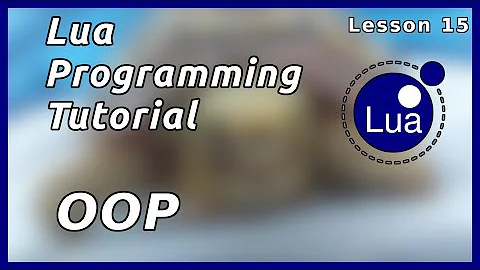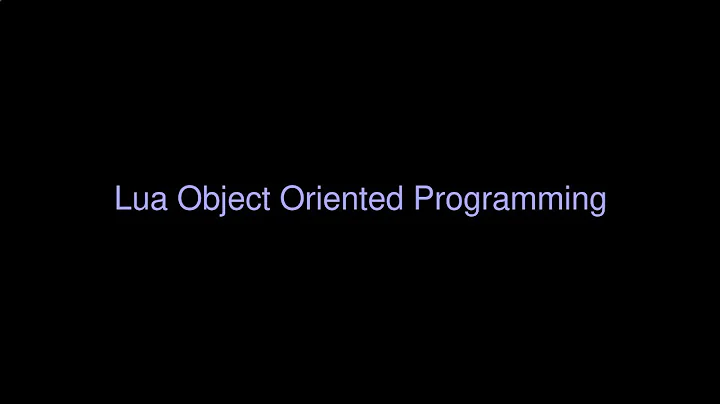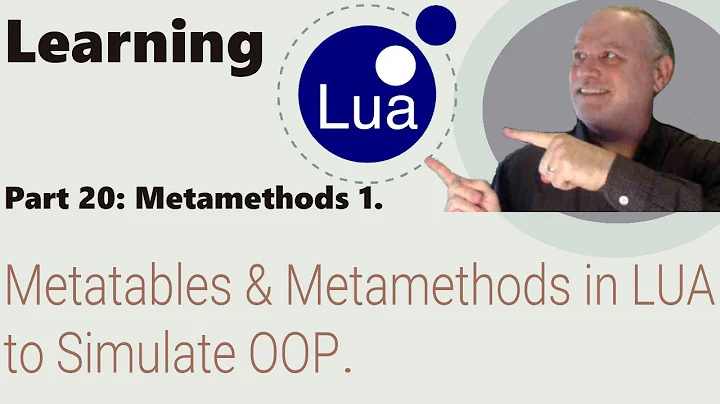How can one implement OO in Lua?
Solution 1
I like to think of OOP as being the encapsulation of data inside a container (the Object) coupled with a subset of operations that can be done with this data. There IS a lot more to it, but let's assume that this simple definition is all and build something in Lua from it (also some familiarity with other OO implementations can be a nice boost for the reader).
As anyone with a little exposure to Lua may know, tables are a neat way to store key-value pairs and in combination with strings, things start to become very interesting:
local obj = {} -- a new table
obj["name"] = "John"
obj["age"] = 20
-- but there's a shortcut!
print("A person: " .. obj.name .. " of the age " .. obj.age)
String values as keys in a table can be accessed in a way very alike to the members of a struct in C or the public members of an object in C++/Java and similar languages.
And now for a cool magic trick: let's combine this with anonymous functions.
-- assume the obj from last example
obj.hello = function ()
print("Hello!")
end
obj.goodbye = function ()
print("I must be going.")
end
obj.hello()
obj.goodbye()
Awesome right? We now have means of having functions stored inside our tables, and again you can see it resembles how methods are used in other OOP languages. But something is missing. How can we access the data that belongs to our object inside our method definitions? This is generally addressed by changing the signature of the functions in the table to something like this:
-- assume the obj from last example
obj.inspect = function (self)
print("A person: " .. self.name .. " of the age " .. self.age)
end
obj.hello = function (self)
print(self.name .. ": Hello! I'm " .. self.name)
end
obj.goodbye = function (self)
print(self.name .. ": I must be going.")
end
-- now it receives the calling object as the first parameter
obj.inspect(obj) -- A person: John of age 20
obj.hello(obj) -- John: Hello! I'm John
obj.goodbye(obj) -- John: I must be going
That solves it in a simple manner. Maybe drawing a parallel to the way things work in Python (methods always get a explicit self) can aid you in learning how this works in Lua. But boy, isn't it inconvenient to be passing all these objects explicitly in our method calls? Yeah it bothers me too, so there's another shortcut to aid you in the use of OOP:
obj:hello() -- is the same as obj.hello(obj)
Finally, I have just scratched the surface of how this can be done. As has been noted in Kevin Vermeer's comment, the Lua Users Wiki is an excellent source of information about this topic and there you can learn all about how to implement another important aspects of OOP that have been neglected in this answer (private members, how to construct objects, inheritance, ...). Have in mind that this way of doing things is a little part of the Lua philosophy, giving you simple orthogonal tools capable of building more advanced constructs.
Solution 2
For a quick and dirty oo implementation I do something like -
function newRGB(r,g,b)
return {
red=r;
green=g;
blue=b;
name='';
setName = function(self,name)
self.name=name;
end;
getName = function(self)
return self.name;
end;
tostring = function(self)
return self.name..' = {'..self.red..','..self.green..','..self.blue..'}'
end
}
end
which can then be used like -
blue = newRGB(0,0,255);
blue:setName('blue');
yellow = newRGB(255,255,0);
yellow:setName('yellow');
print(yellow:tostring());
print(blue:tostring());
for a more full featured approach I would use an oo library as was mentioned by eemrevnivek. You can also find a simple class function here which is somewhere between full on library and quick and dirty.
Solution 3
This is already answered, but anyway, here's my oop implementation: middleclass.
That lib provides the bare minimum for creating classes, instances, inheritance, polymorphism and (primitive) mixins, with an acceptable performance.
Sample:
local class = require 'middleclass'
local Person = class('Person')
function Person:initialize(name)
self.name = name
end
function Person:speak()
print('Hi, I am ' .. self.name ..'.')
end
local AgedPerson = class('AgedPerson', Person) -- or Person:subclass('AgedPerson')
AgedPerson.static.ADULT_AGE = 18 --this is a class variable
function AgedPerson:initialize(name, age)
Person.initialize(self, name) -- this calls the parent's constructor (Person.initialize) on self
self.age = age
end
function AgedPerson:speak()
Person.speak(self) -- prints "Hi, I am xx."
if(self.age < AgedPerson.ADULT_AGE) then --accessing a class variable from an instance method
print('I am underaged.')
else
print('I am an adult.')
end
end
local p1 = AgedPerson:new('Billy the Kid', 13) -- this is equivalent to AgedPerson('Billy the Kid', 13) - the :new part is implicit
local p2 = AgedPerson:new('Luke Skywalker', 21)
p1:speak()
p2:speak()
Output:
Hi, I am Billy the Kid.
I am underaged.
Hi, I am Luke Skywalker.
I am an adult.
Solution 4
The approach I use usually goes like this:
class = {} -- Will remain empty as class
mt = {} -- Will contain everything the instances will contain _by default_
mt.new = function(self,foo)
local inst={}
if type(foo) == "table" then
for k,v in pairs(foo) do
inst[k]=v
end
else
inst.foo=foo
end
return setmetatable(inst,getmetatable(class))
end
mt.print = function(self)
print("My foo is ",self.foo)
end
mt.foo= 4 --standard foo
mt.__index=mt -- Look up all inexistent indices in the metatable
setmetatable(class,mt)
i1=class:new() -- use default foo
i1:print()
i2=class:new(42)
i2:print()
i3=class:new{foo=123,print=function(self) print("Fancy printing my foo:",self.foo) end}
Well, conclusion: with metatables and some clever thinking, about anything is possible: metatables are the REAL magic when working with classes.
Related videos on Youtube
Comments
-
Łukasz Gruner about 4 years
Lua does not have build in support for OO, but it allows you to build it yourself. Could you please share some of the ways one can implement OO?
Please write one example per answer. If you have more examples, post another answer.
-
Łukasz Gruner about 13 yearsI will add reward to it, once I figure out how, so top answer in let's say 'about-a-week' gets it :)
-
Lee Louviere about 13 yearsYou mean like C++? Well, better not get into that debate :(
-
 Ashley Davies about 13 yearsLua's PIL has detailed references for it lua.org/pil/16.html
Ashley Davies about 13 yearsLua's PIL has detailed references for it lua.org/pil/16.html -
Kevin Vermeer almost 12 yearsThe Lua Users Wiki has a large collection of resources on ways to implement OOP in Lua. There are a multitude of ways; you can use tables, metatables, proxy tables, or closures. There are also libraries like LOOP and ObjectLua available, but it's very easy to write your own or copy in a reference design.
-
-
fouronnes about 13 yearsGood answer. I would add that you can write
function obj:hello() **stuff here** endinstead ofobj.hello = function(self) **stuff here** end, which looks even more nice ! -
lfzawacki about 13 yearsIMHO it's kinda overkill to include C++ in a lua project to get OOP. Some people would argue (me included) that C++ OOP is actually very convoluted, complex and not actually very true to the original OOP principles. Also the programmer would have to know another language to use it, not very nice... here's a good read on C++ and its OO implementation yosefk.com/c++fqa/class.html
-
 Nasser almost 8 years
Nasser almost 8 yearsI like to think of OOP as being the encapsulation of data inside a container (the Object) coupled with a subset of operations that can be done with this dataThis is typically called object-based, since it is not full OOP. Sometimes also called ADT (Abstract data types). ADT is simpler to handle and can be implemented in almost any language and other than missing inheritance, it has everything one needs. -
 Nasser almost 8 yearsbest and simplest solution I've seen.
Nasser almost 8 yearsbest and simplest solution I've seen.






